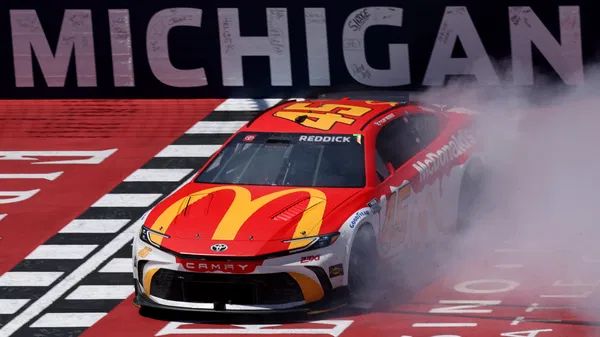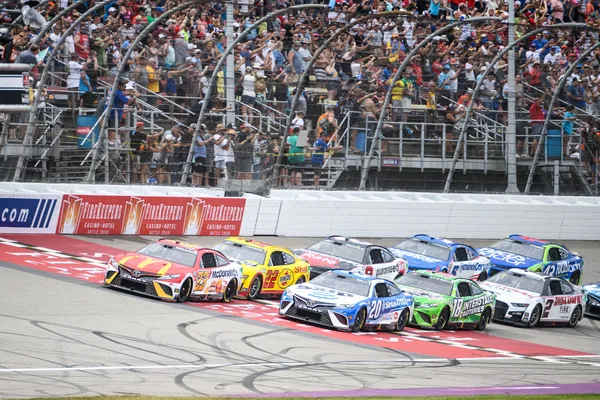“Just chasing ratings… Is that the best thing?” Denny Hamlin asked, echoing a sentiment that many in the NASCAR community have been feeling. This criticism comes in response to the way NASCAR handled the Michigan race weekend, which was plagued by bad weather. After nearly a month of good racing conditions, Mother Nature decided to intervene, leading to a race delay and eventually, a decision to postpone the rest of the race after just 51 laps. While the weather seemed to be the main culprit, many drivers and experts are now questioning whether NASCAR’s scheduling choices are also to blame.
One of the biggest complaints from the NASCAR community is that the current race timings seem to be more about pleasing TV networks than accommodating the loyal fanbase. NASCAR’s decision to schedule late afternoon races, unlike the early afternoon games seen in the NFL, has not gone down well with everyone. Fans were particularly frustrated when the Michigan race, which started on Sunday, had to be completed on Monday. This meant that fans who had to work on Monday missed out on watching the race live, leading to a significant drop in viewership. This issue of timing isn’t just about convenience; it’s about the long-term popularity and sustainability of the sport.
To understand the gravity of the situation, it’s important to look back at NASCAR’s history. The economic recession in 2008 dealt a massive blow to the sport, causing a significant decline in ratings and popularity. It took NASCAR over a decade to recover, and last year, the organization secured a major media rights deal worth $7.7 billion with companies like Amazon and TNT. This deal was supposed to help NASCAR regain its former glory, but recent decisions have led some to wonder if NASCAR is losing sight of what really matters.
As Dale Earnhardt Jr. pointed out, NASCAR’s late afternoon races are mainly to align with their TV partners’ schedules. However, this decision has frustrated many fans, who feel that their needs are being overlooked. On Sunday, fans were left with an incomplete race, and on Monday, they had to juggle work and the race, which was far from ideal. Brett Griffin, co-host of the popular podcast “Door, Bumper, Clear,” voiced his concerns about this issue. During a recent episode, Griffin emphasized the need to adjust race times to better fit the circumstances, particularly when weather is a factor.

Griffin suggested that NASCAR should have moved the Michigan race up by an hour or started it at 1 p.m. instead of later in the afternoon. He argued that if the race had started earlier, it could have been completed on Sunday without any need for a Monday finish. Griffin didn’t hold back in his criticism, stating that NASCAR’s current approach is hurting the sport. He argued that NASCAR needs to find a better balance between meeting the needs of TV networks and catering to the fans who attend the races and watch them live.
Griffin was particularly vocal about the impact of Monday’s race on fan attendance and viewership. He pointed out that the stands were packed on Sunday, and the energy was palpable. However, when the race resumed on Monday, the atmosphere was completely different. Griffin summed up the situation in three powerful words: “lost all that,” referring to the excitement and engagement that was lost due to the race being held on Monday. His point was clear: NASCAR’s timing decisions are alienating fans and damaging the sport’s reputation.
Denny Hamlin, who also had a frustrating run at Michigan due to aerodynamic issues, echoed Griffin’s sentiments. Hamlin criticized NASCAR for constantly chasing ratings, even if it means making decisions that aren’t in the best interest of the sport. He questioned whether the constant focus on ratings and TV deals is really what’s best for NASCAR, especially when it comes at the expense of fan engagement.
Despite the criticism, there was a positive aspect to delaying the race until Monday. Tyler Reddick, who ultimately won the race, might not have had the same opportunity if the race had resumed on Sunday under less-than-ideal conditions. The decision to postpone the race allowed for a fairer competition, which Reddick capitalized on by securing his second win of the season. Reddick now leads the point standings, with a ten-point advantage over Chase Elliott.
Griffin acknowledged that while the delay was frustrating for fans, it was ultimately the right call for the integrity of the race. He praised NASCAR for avoiding a situation where the playoff picture could have been unfairly altered due to bad weather and fading daylight. However, this positive outcome doesn’t completely overshadow the concerns about race scheduling and fan engagement.
As the season heads into its final stretch, with just two regular-season races left before the playoffs, NASCAR finds itself at a crossroads. There are still four open spots in the playoffs, and the upcoming races at Daytona and Darlington will be crucial for drivers fighting to secure their positions. As NASCAR looks to the future, it will need to carefully consider how its scheduling decisions impact both the fans and the sport’s long-term success.
While the Michigan race is now in the rearview mirror, the questions raised by this weekend’s events are far from settled. Will NASCAR continue to prioritize TV deals over fan convenience? Or will it find a way to better balance the needs of both? As we wait for the answers, one thing is clear: the fans, who have supported the sport through thick and thin, deserve more consideration when it comes to how and when races are held. Let’s hope that the lessons from Michigan lead to better decisions in the future, for the sake of the fans and the sport itsel




